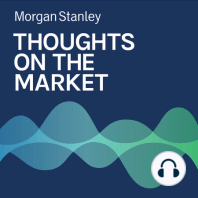4 min listen

Retail Investing, Pt. 2: ESG and Fixed Income
Retail Investing, Pt. 2: ESG and Fixed Income
ratings:
Length:
9 minutes
Released:
Apr 29, 2022
Format:
Podcast episode
Description
As investors look to diversify their portfolios, there are two big stories to keep an eye on: the historic rise in bond yields and the increased adoption of ESG strategies. Chief Cross-Asset Strategist Andrew Sheets and Chief Investment Officer for Wealth Management Lisa Shalett discuss.Lisa Shalett is Morgan Stanley Wealth Management’s Chief Investment Officer. She is not a member of Morgan Stanley Research.----- Transcript ----- Andrew Sheets Welcome to Thoughts on the Market. I'm Andrew Sheets, Chief Cross-Asset Strategist for Morgan Stanley Research.Lisa Shalett And I'm Lisa Shalett, Chief Investment Officer for Morgan Stanley Wealth Management.Andrew Sheets And today on the podcast, we'll be continuing our discussion on retail investing, ESG, and what’s been happening in Fixed income. It's Friday, April 29th at 4:00 p.m. in London.Lisa Shalett And it's 11:00 a.m. in New York.Andrew Sheets Lisa, the other enormous story in markets that's really impossible to ignore is the rise in bond yields. U.S. Treasury yields are up almost 100 basis points over the last month, which is a move that's historic. So maybe I'd just start with how are investors dealing with this fixed income move? How do you think that they were positioned going into this bond sell off? And what sort of flows and feedback have you been seeing?Lisa Shalett I think on the one hand, we've been fortunate in that we've been telegraphing our perspective to be underweight treasuries and particular underweight duration for quite a long time. And it's only been really in the last three or four weeks that we have begun suggesting that people contemplate adding some duration back to their portfolios. So the first thing is I don't think it has been a huge shock to clients that after what has been obviously a 40 plus year bull market in bonds that some rainier days are coming. And many of our clients had moved to short duration, to cash, to ultra-short duration, with the portions of their portfolios that were oriented towards fixed income. I think what has been more perplexing is this idea of folks using the bond sell off as an opportunity to move into stocks under the rationale of, quote unquote, there is no alternative. That's one of the hypotheses or investment themes that we’re finding we have to push up against hard and ask people are they not concerned that this move in rates has relevance for stock valuations? And over the last 13 years, the moves that we have seen in rates have been sufficiently modest as to not have had profound impacts on valuations. These very high above average multiples have been able to hold. And very few investors seem to be blinking an eye when we talk about equity risk premiums collapsing. So, you know, the answer to your question is clients in the private client channel avoided the worst outcomes of exposure to long duration rates, were not shocked, and have actually used some of the selloff in bonds or their short duration positions to actually fund increasing stock exposures. So that's I think how I would describe where they're at.Andrew Sheets And that's really interesting because there are these two camps related to what's been happening. One is, look at bonds selling off. I want to go to the equity market. But at the same time as bond yields have gone from very low levels to much higher levels, the relative value argument of bonds versus stocks, this so-called equity risk premium, this additional return that in theory you get for investing in more risky equities relative to bonds has really been narrowing as these yields have come up. Lisa, how do you think about the equity risk premium? How do you think about, kind of, the relative value proposition between an investment grade rated corporate bond that now yields 4-4.25% relative to U.S. equities?Lisa Shalett One of the things that we're trying to remind our clients is they live in an inflation adjusted world and real yields matter. And from where we're sitting, the recent dynamic
Released:
Apr 29, 2022
Format:
Podcast episode
Titles in the series (100)
Mike Wilson: Weighing a Potential Fed Rate Cut by Thoughts on the Market